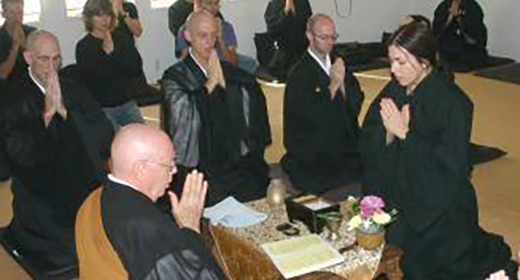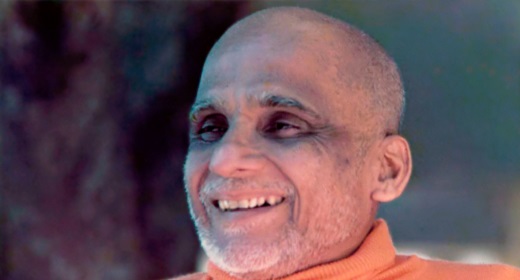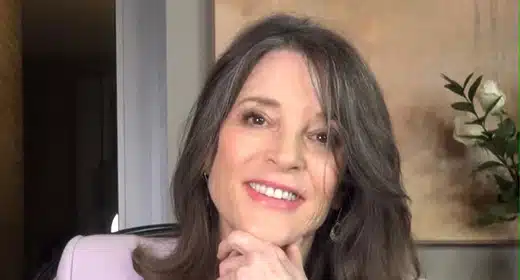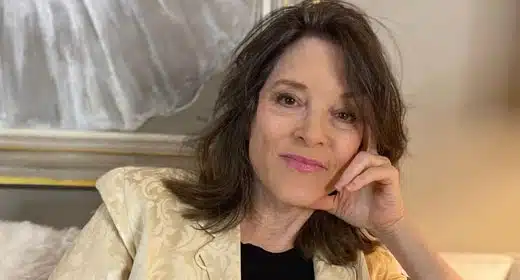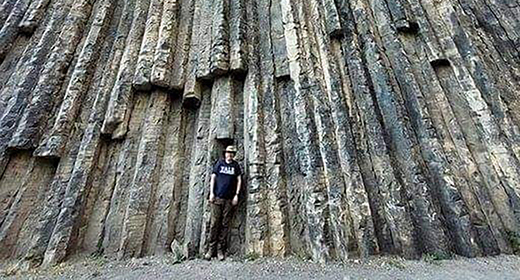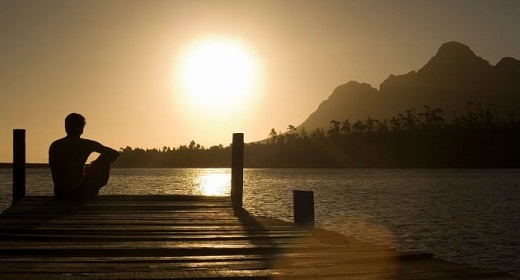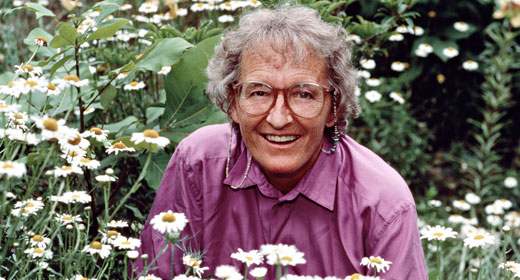Milton’s Secret is a live action film for the whole family. Based on a book by Eckhart Tolle
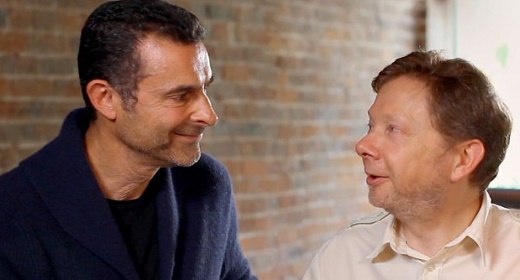
(Author of The Power of Now & A New Earth) and Robert Friedman (Publisher of Conversations with God), the film will bring the wisdom of one of the most important spiritual teachers of our time to a mainstream, family audience. OMTimes is Grateful to have connected with the film’s Director, Barnet Bain and Eckhart Tolle when they recently met at the Vancouver headquarters of Hulo Films to discuss the upcoming film.
A Conversation with Barnet Bain and Eckhart Tolle
OMTimes: How did the two of you build your interest in transformational entertainment?
Eckhart Tolle: I love watching movies and my main life interest and my purpose in life is to bring spiritual awakening into this world, to be a vehicle for the flowering of consciousness, to help people to live more consciously with less unnecessary suffering and self-generated unhappiness, so that’s my mission in life, that’s my life purpose, so bringing together my interest in movies and my life purpose then naturally this has come together so I became interested in movies that have the power to transform consciousness.
Barnet Bain: I’ve been making spiritually themed movies for a very long time. At the beginning of my career I made a movie as a screen writer, called Jesus, or The Jesus Movie. That was the first job I ever had after film school. I was hired to write the screenplay for Warner Brothers. Jesus, has gone on to be the most widely seen movie in the world. It’s pretty unbelievable. I thought it was a great opportunity to make my way through a career and looking back, I can see that film as a piece in an ongoing puzzle that all fits together in a way that is so perfect that it never could have been planned. Long before I realized I was exploring something, that I was looking to develop something in myself, I was just naturally drawn to movies and entertainments and stories that had a core element of spiritual discovery.
Since then, I have made What Dreams May Come as a Producer and the Celestine Prophecy movie as a Writer and Producer, and Homeless to Harvard, which was nominated for three Emmies including Best Movie. And I’ve made others….
OMTimes: Barnet, what is Mindfulness to you and why is mindfulness so important today?
Barnet Bain: Mindfulness is developing an awareness of the thoughts that move through and feelings that we move through without getting drawn into the meanings or being drawn into taking action or getting sucked into the story… and then like house guests, eventually they all leave.
One thing that mindfulness practice does is it allows us to pay attention to all the thoughts and all the feelings that wander through our awareness and we become more attuned to being a container for those things and less identified with them.
So now we begin to have a relationship with all our structured imaginings and in doing so, life begins to take on, from my perspective, a more enchanted, more dreamy experience. What is possible for us begins to expand because we are not so rigidly contained by the way that our thoughts and imaginations have been structured.
Mindfulness has never been more important considering how quickly the events of the world move in such an accelerated, such a frantic time. We are battered around like a cat with a toy. Our attention goes from here, to the next thing, to the next thing and we’re triggered from one response of fear, to another one of connection, to the threat of loss. It’s just constantly, constantly in play in ways that 15, 20, 30 years ago didn’t exist because things moved at such a different cadence. And so it is more critical than ever if you believe, as we do that our experience of reality is the result of the magical alchemy of the creation of our thoughts, our beliefs, our decisions, our attitudes, our feelings. All of these are, for the most part, unconscious. Mindfulness allows us to watch these thoughts and choices and decisions without being triggered and having to take action and give meaning. And so suddenly we are able to see beyond the waterline to see the iceberg. We are seeing with x-ray glasses, the ability to see what is below the surface of the way we do life.
These are the being states, that mindfulness allows us to discover. When we discover who we are being in the moment, then the opportunity to choose up to a higher ground to a different level of response is there for the first time. A fish doesn’t know it’s in water until it throws itself on the bank and flops around for a while, and has that moment of discovery, ‘I’m not in Kansas Toto.’ Mindfulness allows us, we don’t have to flop around on the bank, it doesn’t have to be as difficult as it is for some. It’s a lot more difficult to be reactive to the world, to think that you can out-think life. There are other states of consciousness beyond thinking but mindfulness puts us in touch with the being state of who we are. And with that awareness, reality becomes a very different kind of experience. It’s not as reactive, it begins to mellow out and there is suddenly room for the miraculous.
OMTimes: The book and film promise to bring Mindfulness to a youth audience. Eckhart, why did you write the book, Milton’s Secret? How did you start out on this journey?
Eckhart Tolle: Well people had been often writing to me and saying, ‘can you not write something for children?’ I felt I needed somebody else and couldn’t quite do it myself because I never had children so it’s harder for me, never having brought up a child, to enter the universe of the child. So that’s where my co-author, Robert Friedman came in and helped.
When the suggestion came to me that I could co-author the book, I remembered all the letters and emails that I had received in the last few years from parents asking for that kind of thing, but I never really felt up to it myself. Now I’m glad it happened that way. I never went out and said ‘I want to do this.’ I never do that, I wait for things to come to me either within, or without, and I go along with it, and that’s how it happened.
More and more teachers are also bringing that state of presence. In recent times I’ve received more and more emails from teachers that they are beginning to teach presence in their classroom without necessarily calling it that or calling it anything. They are doing that not as part of the official curriculum, it’s like an underground movement, not yet officially recognized by the educational authorities, at least not as far as I know!”
OMTimes: I understand the bullying is also a key theme of the movie?
Eckhart Tolle: Only in the last few years has there been an awareness that this is a big problem and a big source of suffering for many, many children. Of course bullying is not a new phenomenon but for a very long time nobody talked about it. I don’t know why, but suddenly, now, bullying is in the news. Perhaps it is time that there is an awareness of this, of certain unconscious patterns. These unconscious patterns become conscious and then they begin to change… so there is an awareness… quite often you read about bullying in the news and that’s why it’s in the movie… and of course the financial distress that many people are going through in this time. That is the reality of millions of people or the fear or the uncertainty about economic situation and the fear that goes with it if you are not present you can constantly be in that state of fearful anticipation. What might happen to your job… that you might lose your job or you might not be able to pay your mortgage anymore… and all kinds of dreadful things could happen. All of this reflected in the movie as that is the daily reality for all sorts of people. Of course that wasn’t in the book, but I’m glad that’s in the screenplay.
OMTimes: We’ve heard a lot about the film, the bully, the Grandfather and, of course, Milton. But what is the message?
Eckhart Tolle: The central message is that it is possible to live in a different state of consciousness. A state of consciousness that does not generate unnecessary unhappiness and suffering and anxiety. So that is the underlying theme of the movie that is what it is about. And that’s why it is transformational.
Connect with Milton’s Secret at http://miltonssecretmovie.com
Synopsis
Milton’s Secret presents the timeless wisdom of The Power of Now in a live action film for the whole family.
Milton Adams is stressed. It’s no picnic being 11 years old in a world that is growing more uncertain every day. Milton’s mom and dad argue every night as their careers and financial security unravel around them. Milton’s community is in crisis, and to top it off, he is tormented by the neighborhood bully.
When Grandpa Howard comes to visit, Milton discovers that rehashing bad experiences, and worrying about the future only makes things worse.
With a little practice, Milton learns his Grandpa’s secret for coping with a world in crisis: most things have a surprising way of working out when you flow with the power of Now.
In an age that seems to be growing more chaotic by the day, we sometimes wish we could go back to simpler times. We need new answers. Milton’s Secret is a thought provoking family film based on the story by acclaimed spiritual teacher Eckhart Tolle, author of worldwide bestsellers The Power of Now and A New Earth and Robert Friedman, publisher of Conversations with God.
DIRECTOR’S NOTES WITH BARNET BAIN
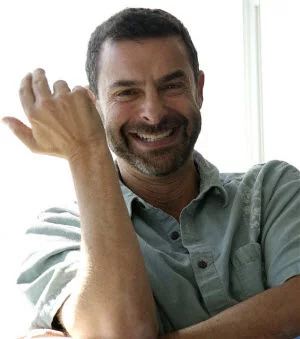 As a filmmaker and radio broadcaster I’m attracted to the deepest truths that affect humanity; stories that inspire hope and vision and model new responses to the challenges of being alive in a world becoming more uncertain and less civil every day.
As a filmmaker and radio broadcaster I’m attracted to the deepest truths that affect humanity; stories that inspire hope and vision and model new responses to the challenges of being alive in a world becoming more uncertain and less civil every day.
When Eckhart Tolle agreed to let me to film his story Milton’s Secret, I didn’t hesitate. I leapt at the chance. I have made a life’s work of stewarding innovative projects that celebrate the human spirit, but I am especially grateful to Eckhart and Robert Friedman for entrusting me to make their story about mindful awareness ring true to a dedicated readership that has purchased more than 15 million of Eckhart’s bestselling books to date, and for the opportunity to present mindfulness in a mainstream motion picture for the first time ever.
In an age of financial, social and political breakdown, we sometimes wish we could go back to simpler times. We long for answers. Milton’s Secret models, but not mandates a different response to the stresses and chaos of modern life. It shows us a way to pay closer attention to what is happening within us; our thoughts, feelings, and emotions, enabling us to better cope with the trials of everyday living.
Milton’s Secret centers on a boy who discovers that rehashing bad experiences from his past and worries about his future are preventing him from enjoying real happiness through living in the present moment. We will model by example — but not preach — practical tools to keep alive curiosity, compassion and coping skills that enable children and their parents alike to manage stress and pay attention to what really matters amidst the frantic pace of life.
As a general note, the tone of the movie will be a little more adult without sacrificing our family audience. For our young protagonist and his friends we are referencing The Suburbs (video by Arcade Fire) Is Anybody There?, The Spectacular Now and Whale Rider. The OVERALL LOOK of the movie will be Magical, Playful, but Stressed. Reference – Magical Realist paintings of George Tooker. We should immediately get a sense of the chaotic world in every shot. For example – not just background extras, but a mom dealing with a toddler’s tantrum, or distraught motorists venting road rage. It is a world full of blocked personal urges; impersonal phone trees, indifferent service, and systemic frustration. Recently, at the airport parking lot in Montreal, I encountered a young woman trying to find someone – anyone to help her in the exit cue. There was not an attendant anywhere. The machine had taken her money, and the intercom was broken. When I found her she was in tears. “You could be dead and dying,” she lamented, “and no one would notice. That’s progress?”
So this is the environment of our movie – it is the kind of imagery that is generated from a systemic falling away of life as we’ve known it. It is definitely NOT Disneyland.
We will tell this beautiful story, and at the same time inspire as many people as we can to stop stressing and start living! I am proud to be given the opportunity to make this movie, and to have Hulo Films as collaborators.

